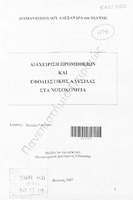| dc.contributor.advisor | Πολύζος, Νικόλαος | |
| dc.contributor.author | Διαμαντοπούλου, Αλεξάνδρα Ι. | |
| dc.date.accessioned | 2015-09-10T05:53:49Z | |
| dc.date.available | 2015-09-10T05:53:49Z | |
| dc.date.issued | 2007 | |
| dc.identifier.uri | https://dione.lib.unipi.gr/xmlui/handle/unipi/7373 | |
| dc.format.extent | 100 | el |
| dc.language.iso | el | el |
| dc.publisher | Πανεπιστήμιο Πειραιώς | el |
| dc.rights | Attribution-NonCommercial-NoDerivatives 4.0 Διεθνές | * |
| dc.rights.uri | http://creativecommons.org/licenses/by-nc-nd/4.0/ | * |
| dc.subject | Equipment and Supplies, Hospital | el |
| dc.subject | Materials Management, Hospital | el |
| dc.subject | Προμήθειες | el |
| dc.subject | Νοσοκομεία -- Διοίκηση και οργάνωση | el |
| dc.title | Διαχείριση προμηθειών και εφοδιαστικής αλυσίδας στα νοσοκομεία | el |
| dc.type | Master Thesis | el |
| dc.contributor.department | Σχολή Οικονομικών, Επιχειρηματικών και Διεθνών Σπουδών. Τμήμα Οικονομικής Επιστήμης | el |
| dc.identifier.call | 362.1'1 ΔΙΑ | el |
| dc.description.abstractEN | The supply management system of the National Health System in Greece has constantly been one of the most difficult problems that the Ministry of Health has to face, as it currently costs 3 billion euros per year. In order to investigate the reasons why this is happening, the current study tries to review the law and the presidential orders that existed in the last decade. Moreover, this review presents the situation of the Greek market concerning the organization and the financial management of the NHS hospitals, laying emphasis on supply management processes in regard with the procurement in public hospital with medical supplies and diagnostic equipment. Finally, a comparative analysis among the NHS in Greece, the Greek private sector and the NHS in England concerning the structure, operations, effectiveness and efficiency of the supply management system. Data were collected after studying the Greek and international bibliography as well as observing the processes that currently applied in greek hospitals. In conclusion, it seems that regardless the amendments in the legal framework, nothing changed, as the prescription of the materials to be supplied remains obscure, the bureaucratic processes continue, while the interference of several ministries make the system of competition slow and cause significant delays. Additionally, the lack of information technology, the non-existence of uniform materials code, the lack of sufficient competent staff to deal with procurement issues and the absence of contemporary methods of financial performance evaluation intensified the problem. On the contrary, the international study and the experience in the Greek private sector proved that the correct use of supply processes, the use of information system, the distinction of the materials (use of barcode), the use of logistics in healthcare services and the use of contemporary financial systems lead to efficiency and to the so called 'value for money. In conclusion, in order to improve the sanitary conditions of the NHS supply system, it is necessary to apply good procurement practices (including the rules of competition), ensure that there is sufficient and experienced staff to deal with procurement issues introduce greater use of information technology and set clear and challenging targets for procurement and supply efficiency improvements. | en |
| dc.corporate.name | Ανώτατο Εκπαιδευτικό Ίδρυμα Πειραιά Τεχνολογικού Τομέα | el |
| dc.contributor.master | Οικονομικά και Διοίκηση της Υγείας | el |



